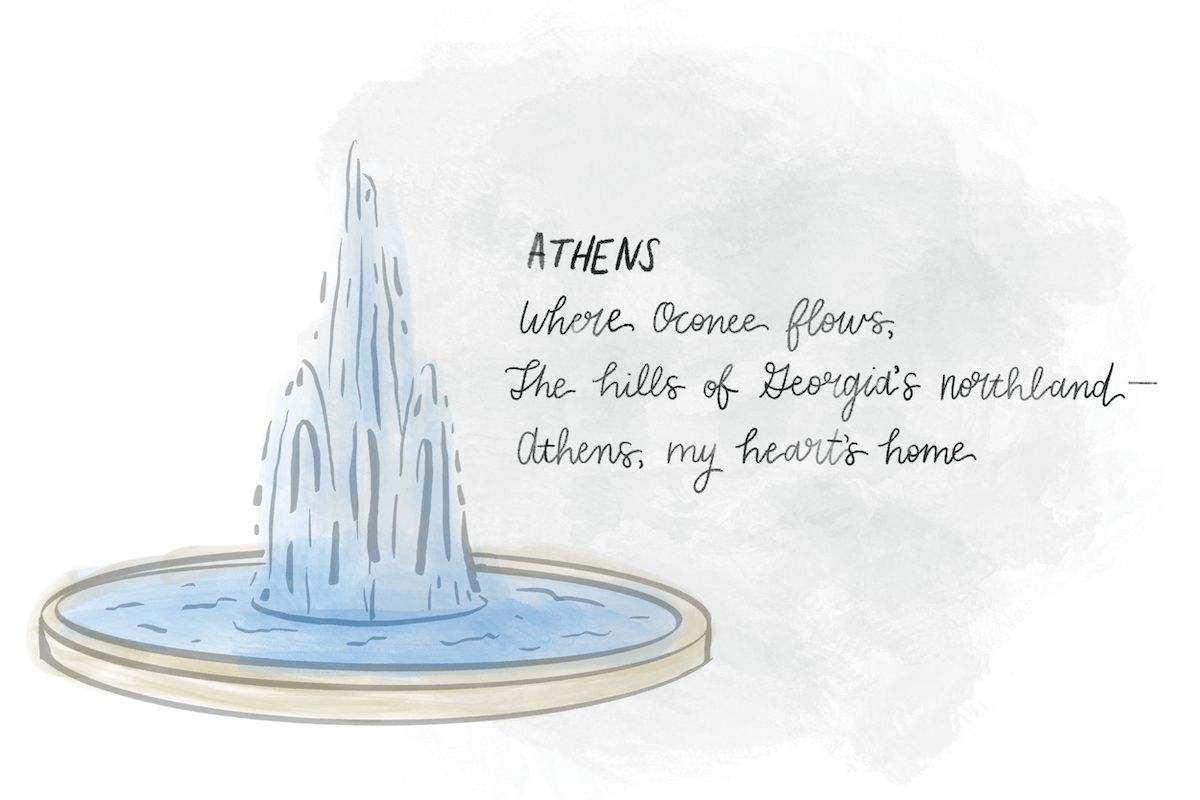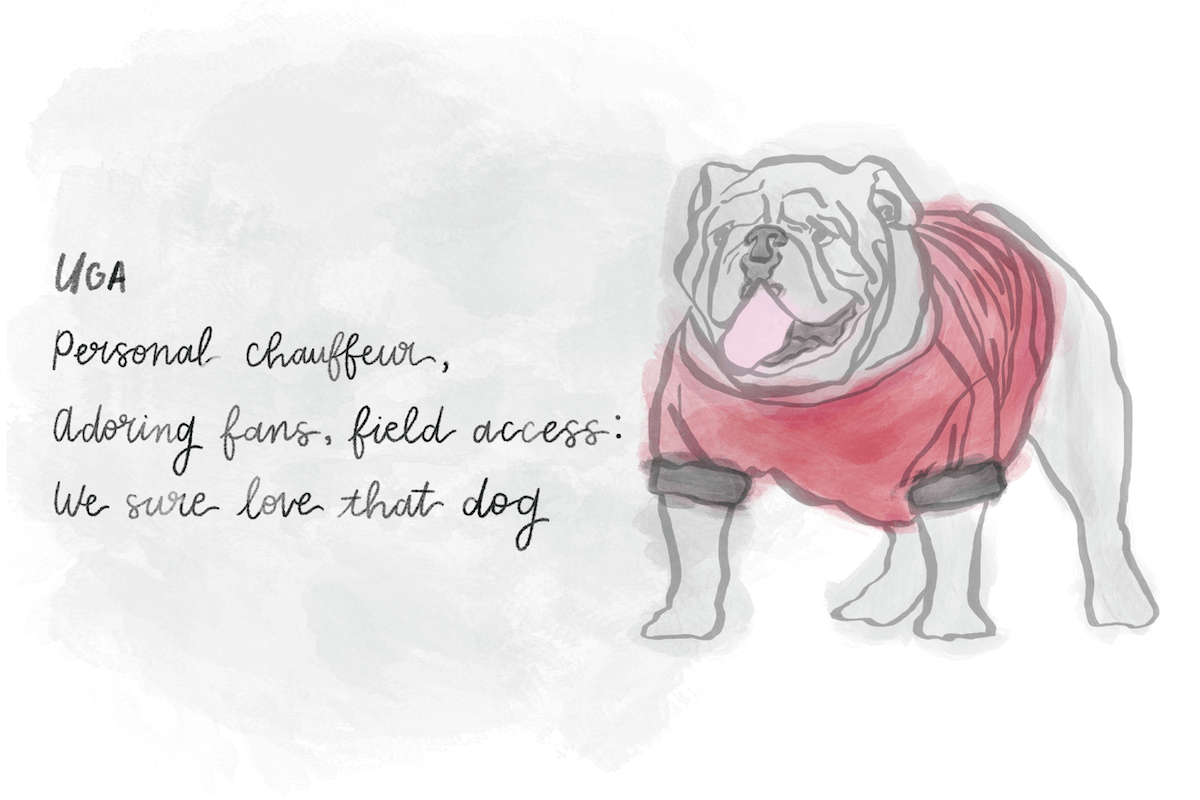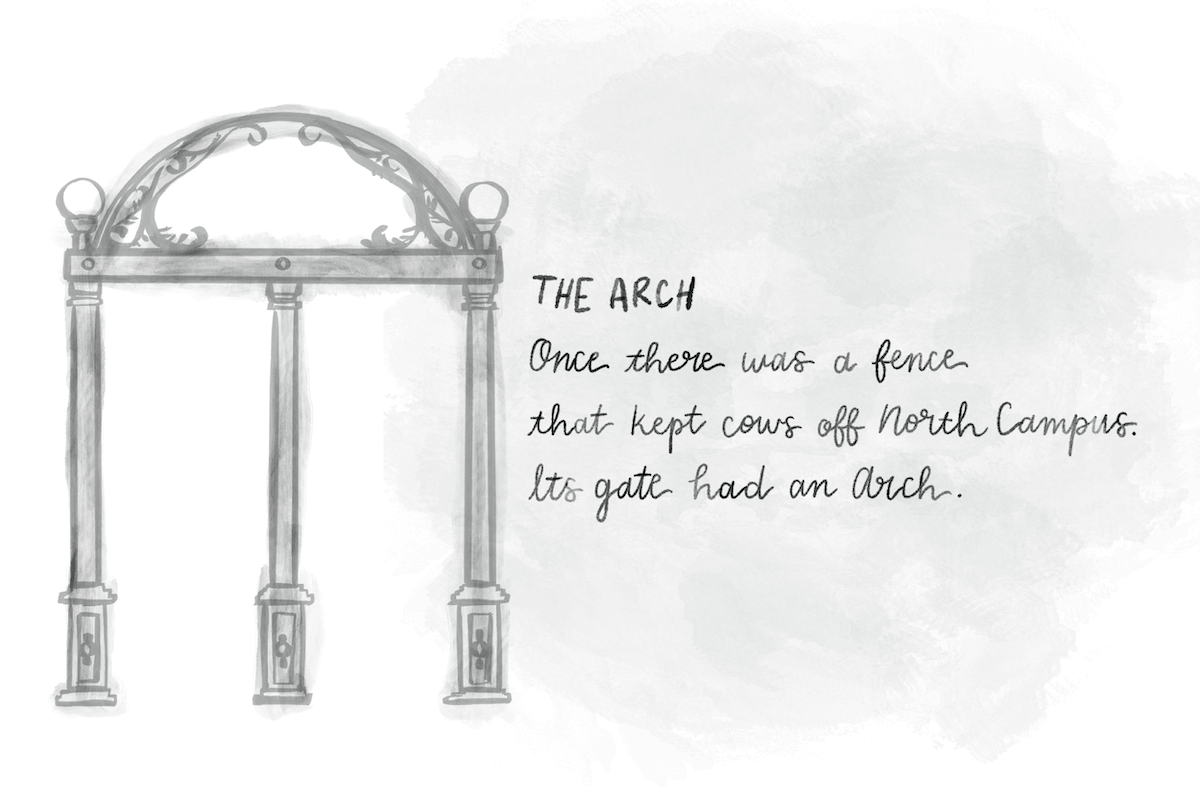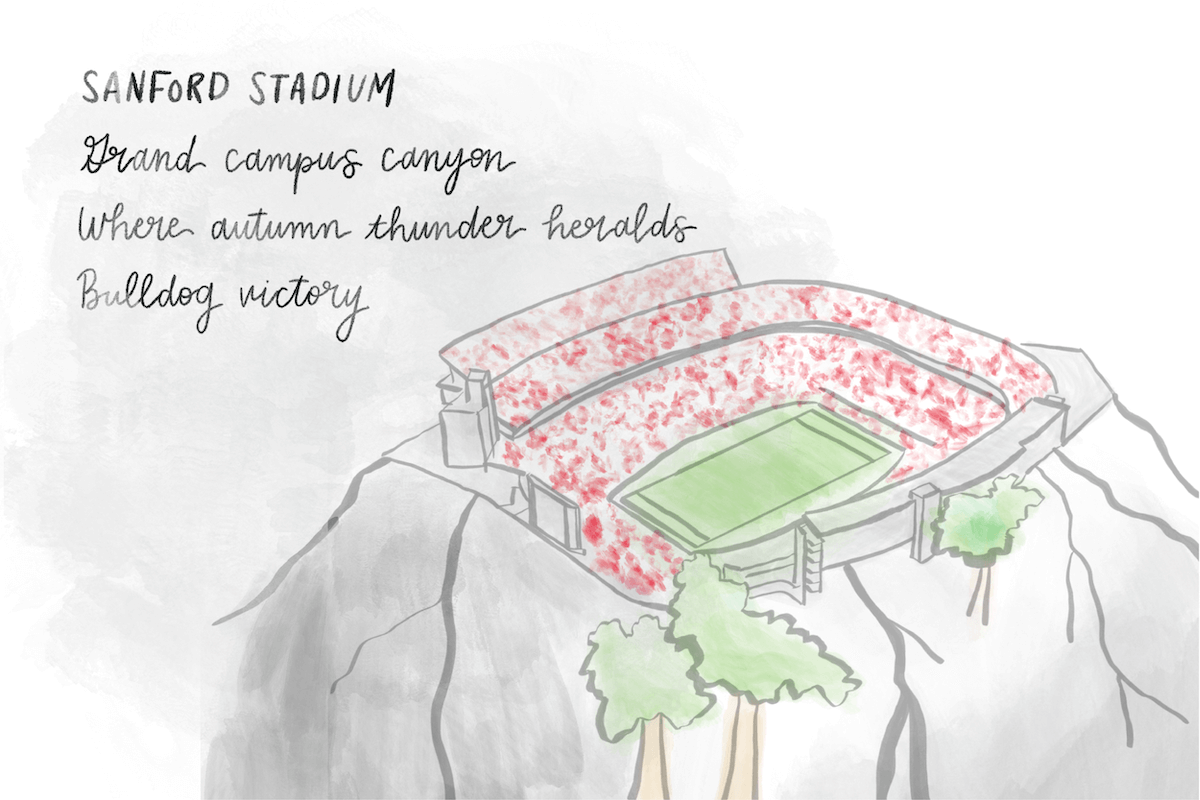Archive for month: April, 2021
From midfield to Capitol Hill: Sanford Stadium means the world to Christina Swoope Carrere
Written by: Charles McNair
Christina Swoope Carrere (BS ’11) first stood on the 50-yard line in Sanford Stadium in the fall of 2004. The nervous teen from Alpharetta, Georgia was only a junior in high school.
It was halftime during a University of Georgia football game, and she was conducting the Redcoat Marching Band as it spelled out G–E–O–R–G–I–A on the gridiron. She had earned this opportunity after winning the UGA Summer Marching Band Camp Drum Major Conducting Competition, representing Atlanta’s Johns Creek High School.
Christina dreamed of one day leading the splendid UGA troupe, even though she didn’t match the typical profile of a Redcoat Drum Major. “Most notably,” she recalls, “I was not a music major.”
Three years later her dream came true. She raised both arms at midfield at the head of that same Redcoat Band – the first Black female drum major in UGA’s history.
In 2009, she once again stood at midfield in Sanford Stadium. This time, she raised a rose bouquet as one of the first Black homecoming queens in UGA history. Christina’s 100-watt smile shone through tears. The Redcoat Band – her Redcoat Band – erupted in celebration.
“That was the moment I realized how much of my life has been changed because of this university,” Christina says. “Some of the most special moments in my life took place on that field.”
Marching into a bright career
Christina’s 50-yard line has now moved north, to Washington, D.C.
At graduation, she was named a Barbara Jordan Health Policy Scholar, working in the office of then U.S. Senator Olympia Snowe. The Jordan program brings talented young scholars to Washington, D.C., to work in congressional offices and learn health policy. Christina showed an aptitude for health policy analysis, with a focus on issues affecting underserved populations. She went on to earn a Master of Science in public health at Johns Hopkins University, then became a policy analyst at the Henry J. Kaiser Family Foundation.
Today she works in the White House Office of Management and Budget, focused on Medicare and the 60 million Americans it serves. She’s tasked with informing views on complex and sensitive policy areas like Medicare eligibility and prescription drugs.
It’s meaningful work. Christina led the development of a Medicare prescription drug reform package that produced nearly $90 billion in savings to the Medicare trust funds, reduced drug prices and modernized drug benefits. She also earned recognition for her pivotal role in developing a balanced government policy to reduce the supply and demand of addictive opioids.
Christina brings the same boundless energy to government work that she brought to UGA.
“Some people burn the candle at both ends,” she says. “I’m the kind who just throws the whole candle in the fire.”
This kind of zeal marked her years at UGA. She was Student Alumni Council vice president and Events Committee chair, Omicron Delta Kappa secretary, a 2009 Presidential Scholar, UGA Outstanding Senior Leader, INROADS Rising Star (and Intern of the Year), UGA EXCEL Award recipient, and UGA Choice Award recipient.
And her UGA honors still haven’t stopped.
In 2020, Christina received UGA’s Young Alumni Award, given to those who attended the university in the past 10 years, and who have embodied the Pillars of the Arch—wisdom, justice and moderation–and provided notable service to UGA.
View from a bridge
Christina loves a quote from former United States First Lady Michelle Obama:
“When you’ve worked hard, and done well, and walked through that doorway of opportunity, you do not slam it shut behind you. You reach back and you give other folks the same chances that helped you succeed.”
“I like to expand on that,” Christina laughs. “Not only do you not slam the door, but you also open all the emergency exits and windows and get a bigger table and pull up chairs.”
“As a trailblazer, it’s my responsibility to make sure I am not the last. A path is only useful if others know it exists, and I’m committed to reaching back to help others find it.”
She’s as good as her word. She stays close to UGA as the immediate past president of the Redcoat Band Alumni Association Board of Directors, the founder and chair of the Redcoat Young Alumni Council, and a 40 Under 40 Class of 2016 honoree. She returns regularly to speak to UGA students and alumni, building new bridges to her alma mater.
And on the subject of bridges, “Some of my favorite UGA memories are of walking across campus with friends and standing on the bridge looking into Sanford Stadium,” Christina says.
From there, Christina can see the 50-yard line.
“It’s a really special place,” she says. “So much happened there that made me who I am.”
Editor’s Note:
Our Georgia trailblazer series profiles Black students at UGA who took the first brave steps to create the diverse and inclusive university we are today. Want to know more about other pioneers?
Charlayne Hunter (ABJ ’63) and Hamilton Holmes (BS ’63) were the first Black students to enroll at UGA.
- Read their accomplishments here: desegregation.uga.edu
Mary Frances Early (MMED ’62, EDS ’67) was the first Black student to graduate from UGA. The College of Education is named for her. Learn more at:
Who let the pets out: National Pet Day
We invited the Bulldog family to share pictures of their pets just in time for National Pet Day. Do you enjoy browsing pictures of adorable animals as much as we do? Paw through these pictures of furry (and feathered!) members of Bulldog Nation.

Wendy Hsiao: This little monster is named Georgia after her mom’s beloved football team. She was adopted 5 years ago – and it’s been the best years of my life!

Kathryn McHugh: Honey was rescued from the Athens-Area Humane Society in March 2019. She now lives with my husband and I, and her pup sister Annie, in Athens. Her favorite place to be is at the lake and she loves to snuggle. She is happy to be chewing on a bone, taking a nap, or sneaking an extra treat. Honey has a sweet personality and is so loved!

Mary Ann Hawthorne: Smokey and Bandit are 8-month-old rescue kittens who are brothers. They are super adorable when they aren’t trying to kill each other.

Anna MacKenzie Clark: Kirby is my Dudley lab on the left, named after Kirby Smart. He loves chasing squirrels and sunbathing! Lutzenkirchen (Lutzie) is my dark Golden on the right, named after one of Auburn University’s tight ends. He loves snuggling his mama and his squeaky donut toy!

Kristin Joyner: Bella and Rocky were surrendered. My neighbor adopted Rocky and we adopted Bella. Both are Boykin Spaniels and are inseparable. Go Dawgs!
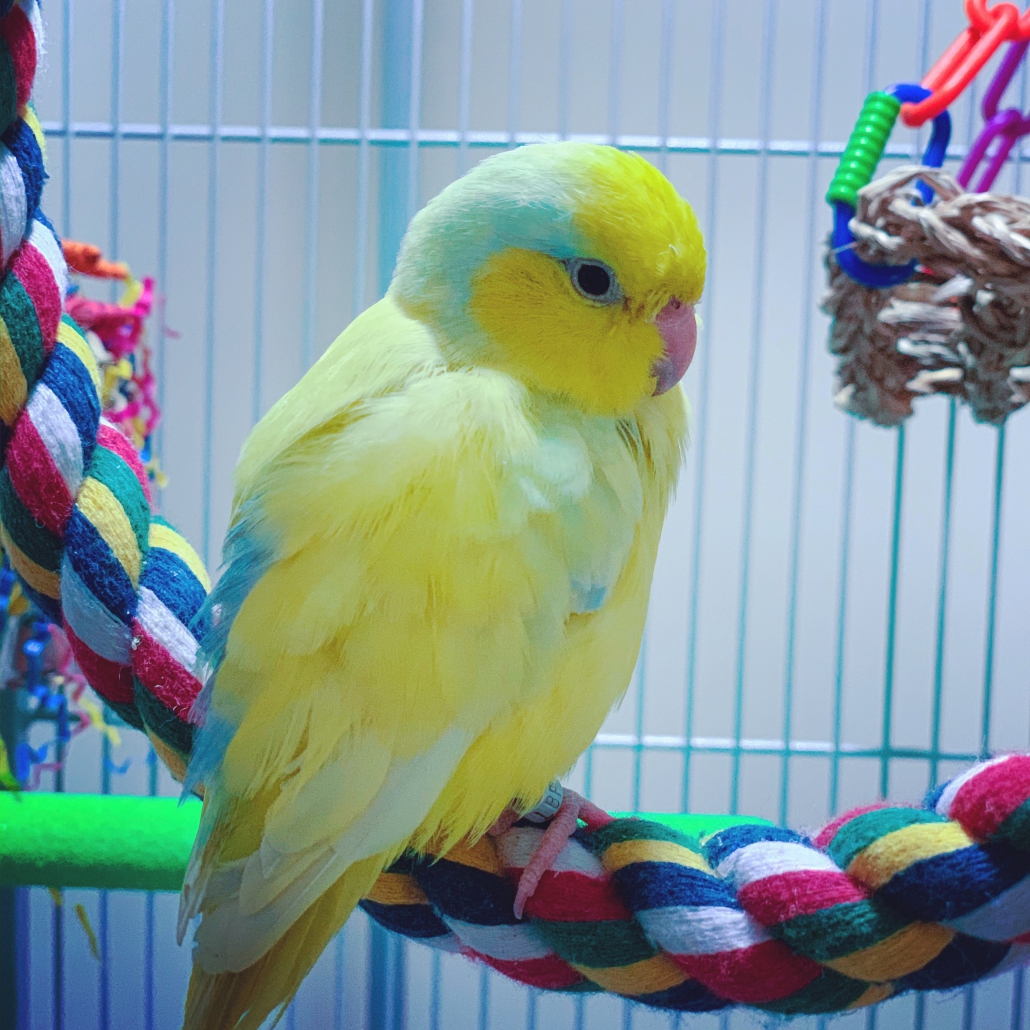
Kim Wuenker Eilers: Ziggy is our 1-year-old pocket parrot. He’s an American Yellow Celestial Parrotlet. Ziggy loves to say “peekaboo” and “what are you doing?” We are trying to teach him to say “Go Dawgs!”

Denise Spangler (dean of UGA’s Mary Frances Early College of Education): Lucy is a 13-year-old Maltese who loves walks, treats, chasing squirrels, and sleeping on the couch while I watch Georgia football.

Stephanie Calhoun: This is Oakley. She is the best ‘rufferee’ in Dawg Nation. Her speed and bark make her great on the field. She takes off every fall football Saturday, though, to watch the Dawgs between the hedges.

Dr. Kristy McManus: Mr. Bigsby is a French Bulldog who was rescued from a horrible breeding situation in Tennessee in October 2015. This picture is of his first visit to the pet store to get his UGA jersey. Of course this made for a great Halloween picture, too! He had a rough first few years of life, but he is well-loved and living like a king now in Athens, Georgia. He is loving life as a member of the Bulldog Nation!

Ginny Henry: Gus is a sweetheart and in this pic was sporting a new ‘do. He was looking dandy with the tie that the groomer gave him. He loves long walks and playing catch and fetch.

Donna Nesmith: We are a house divided. Meet Tebow Big Dawg Dooley and Georgia Natty Rose. Tebow and Georgia provide lots of entertainment around our house with their mischievous shenanigans. If you have never been around an English Bulldog, let me sum up their personality with a phrase, “I will only do it my way.” They take the word stubborn to a whole new level.

Mark Dzikowski: Daisy is a 16-year-old Georgia beagle by birth, but a Georgia Bulldog by the grace of God.

Patricia Dobbins Kirby: Dixie is a hard-playing farm dog! She loves going for rides, taunting her older siblings and running through as many mud puddles as she can find. But, she also loves quiet mornings snoozing between Mom and Dad. She is smart and beautiful!

Kelcie Willis: Sasha is a beagle/Chow Chow (and more!) mix. She was adopted from DeKalb County Animal Services in 2019. On top of being extremely cute, she’s strong willed, food-motivated and eager to learn and play. She’s also quick to bow-wow-wow when she thinks something is amiss or wants a game of tug. She loves to get pets and likes other dogs, but she is very much a people lover. She’s never met a stranger!
Mark Anthony Thomas blazes trails from The Red & Black to the wide world
Written by: Charles McNair
Our steps are all taken in fears―
our doors open with hands that shiver;
our microphones echo voices that crack …
we tumble into the crowds,
lessened by life’s fall-downs,
-From “Self Portrait” by Mark Anthony Thomas,
Copyright © 2011. Thomas has published two books of verse,
As I Look and The Poetic Repercussion: A Poetic & Musical Narrative, along with many articles.
Mark Anthony Thomas took a deep breath one morning in 1997 and stepped onto the campus of the University of Georgia.
A change began.
“My time at Georgia altered the whole trajectory of my life,” Thomas says. “It gave me a preview of what was possible for myself.”
At Redan High School in south DeKalb County, Georgia, Thomas had enjoyed the security of sameness – a familiar environment “with safety to it,” he recalls, “where everybody looks like you.” He’d been a NMOC (Nice Man on Campus), lauded as Most Congenial in the Redan Raiders yearbook.
Now?
“I found that UGA,” Thomas says, “created an equal space for everybody; a space for African-Americans and Latinos, and also a space for those who flew Confederate flags. It was a microcosm of society at large. I can’t say it wasn’t a challenge sometimes, but UGA was always a welcoming environment invested in my success.”
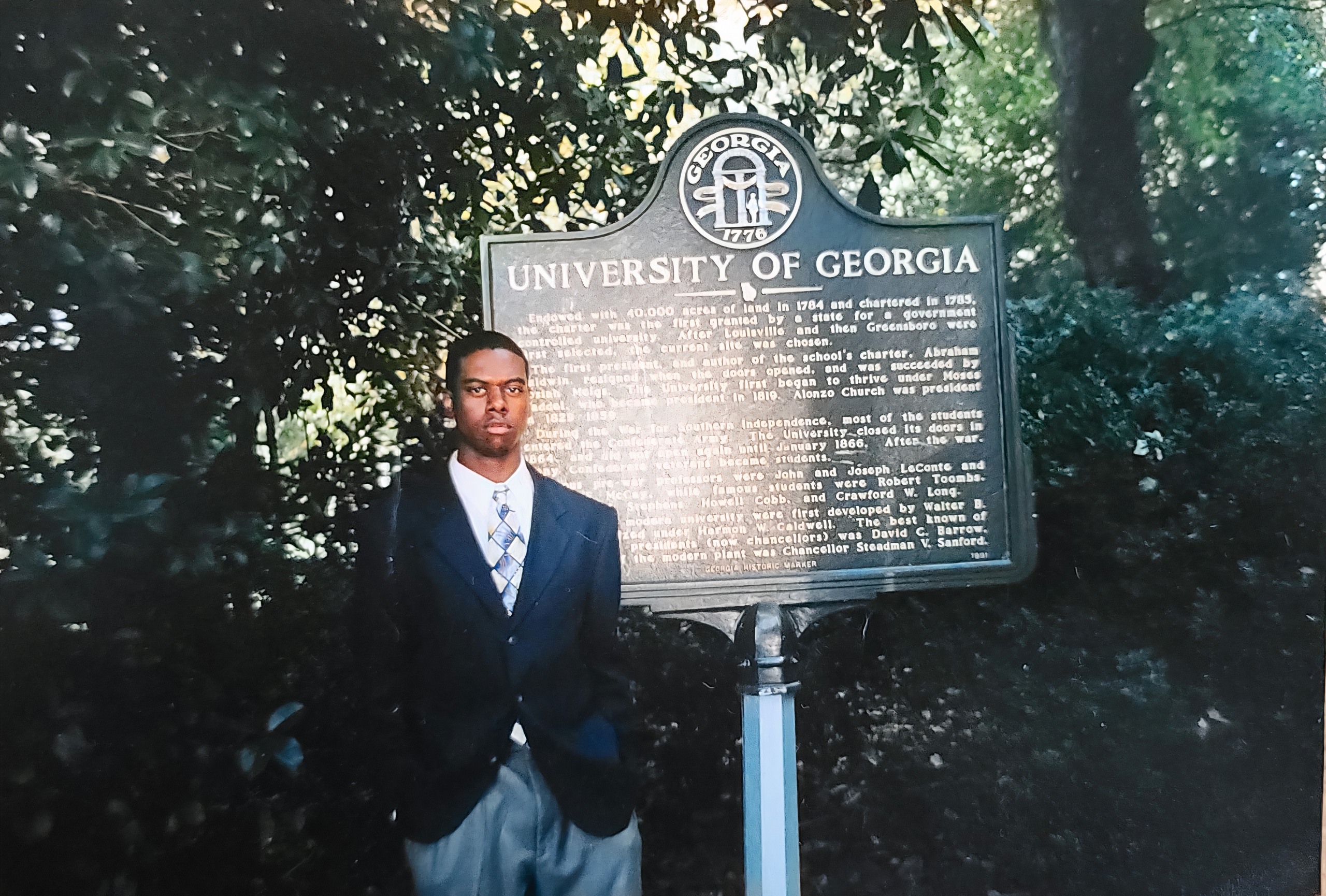
Creating his space
Thomas hit the ground writing.
He joined The Red & Black, putting in the long hours of a reporter as he studied for a business degree. After three years mastering his craft, Thomas’s talent, leadership and vision paid off. In 1999, he became the first Black editor in the 122-year history of the student newspaper – a true Georgia trailblazer.
“Growing up in Georgia, I had always taken an interest in people who created their own spaces,” Thomas says. “I admired those who were great at their craft, people like playwriter August Wilson
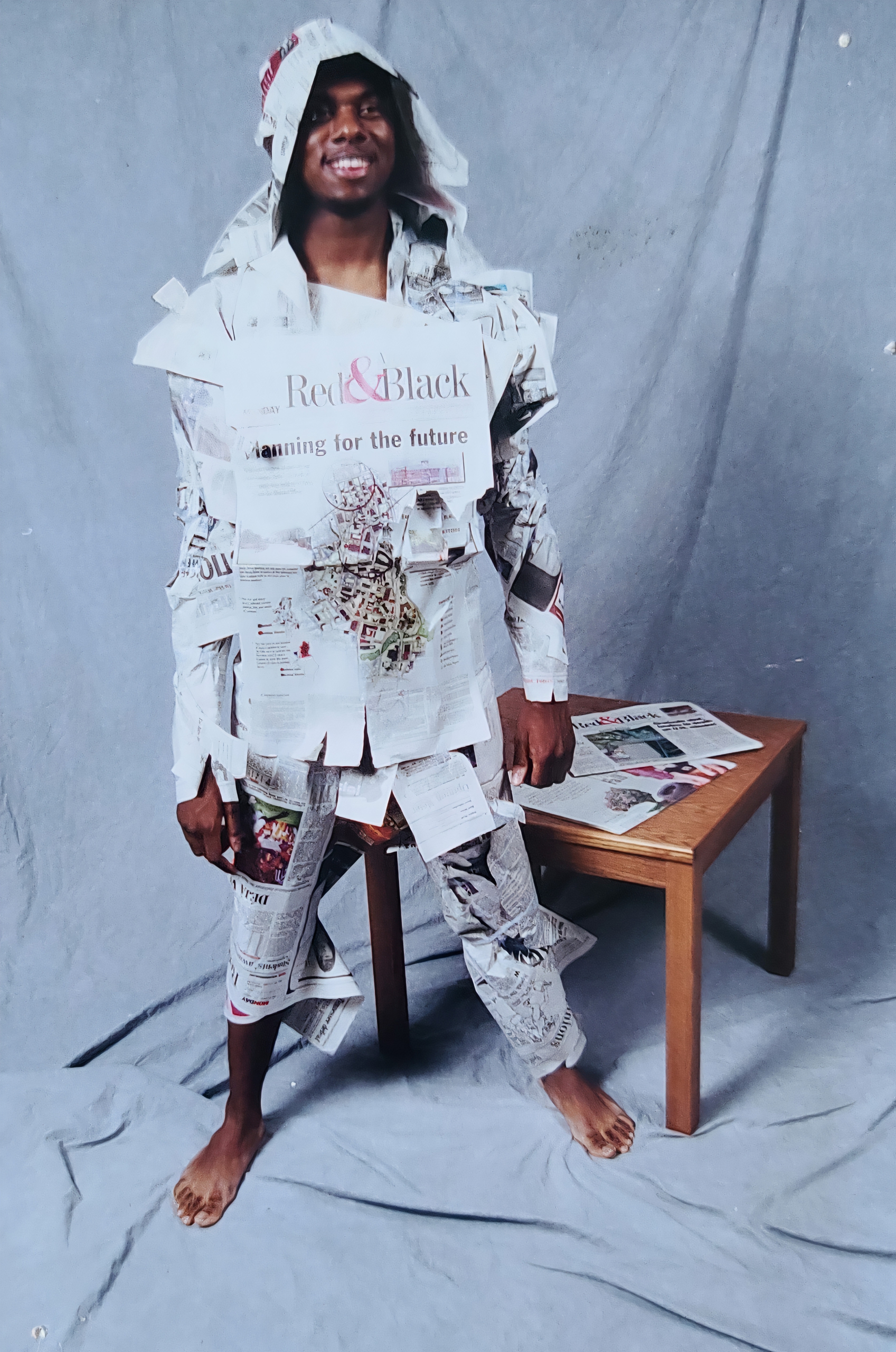
and basketball player Michael Jordan. I also took pride in the accomplishments of the first Black students to enroll at UGA, Charlayne Hunter-Gault (ABJ ’63) and Hamilton Holmes (BS ’63), people who took non-traditional paths to reach their goals.”
Thomas is a writer at heart. He’s published two books of poetry and won awards for journalism, editing and publishing. UGA introduced him to a non-traditional path for writers.
“The Red & Black was an inflection point,” he says. “We were just evolving into digital media. We had our first website while I was there. My initial engagement with technology actually encouraged me to branch out into corporate communication for my career.”
After graduation Thomas first took work with Georgia-Pacific, the Atlanta-based pulp and paper giant, where he managed economic, philanthropic and environmental initiatives. He went on to compile a growingly diverse and impressive resume.
He held a deputy directorship at a New York-based think tank, Center for an Urban Future, relaunching the organization’s magazine, City Limits, and turning it into an influential news source.
He swapped coasts in 2014, serving the city of Los Angeles in an executive role focused on improving the city’s economic development operations. Two of then-Mayor Eric Garcetti’s executive orders and several legislative bills enacted his recommendations.
He returned to the East Coast in 2016 as the first-ever senior vice president of partnerships at the New York City Economic Development Corporation. He helped lead New York’s efforts to woo and win the prized Amazon second headquarters project, although civic protests ultimately drove the multi-billion-dollar project to Arlington, Virginia.
Today, Thomas oversees the Pittsburgh Regional Alliance, where he works with the metropolitan region’s leaders to dream into being the Pittsburgh of tomorrow.
He’s created his own space.
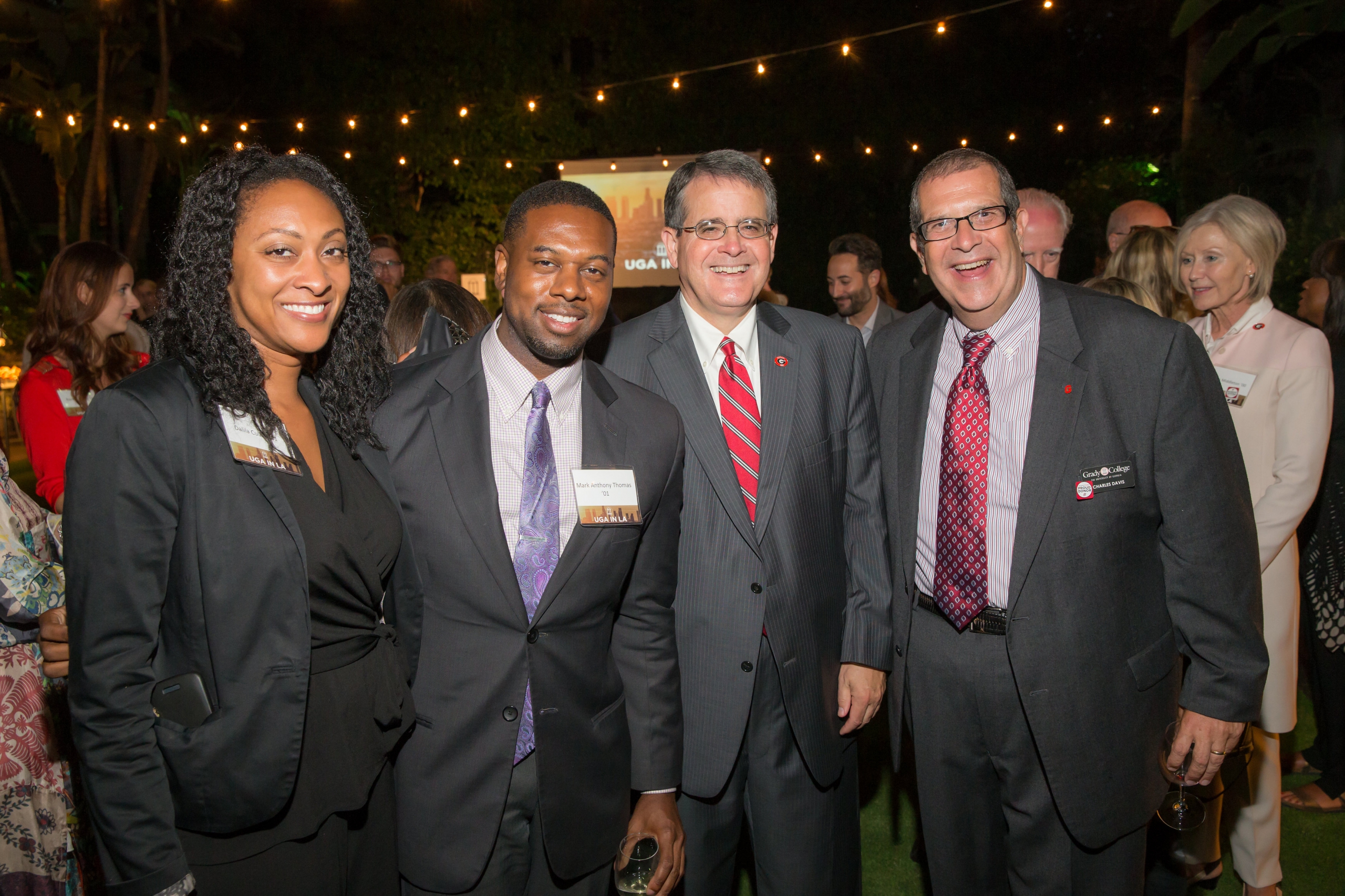
Renaissance man
Even with a dazzling professional resume, Thomas has somehow found time, at only age 41, to write his books, pick up master’s degrees from Columbia University and the Massachusetts Institute of Technology, and throw his energies into dozens of civic, academic, and philanthropic initiatives.
He hasn’t forgotten what he means to UGA. In 2013, the university called him home as a 40 Under 40 honoree, and he keynoted UGA’s inaugural TEDxUGA conference.
He opened his TEDx talk with a story.
At Redan High, he wrote for the school newspaper about local lack of access to technology. The Atlanta Journal-Constitution picked up the story. County planners contacted Thomas and met him. Action followed.
“When I ride back through DeKalb County now, it brings joy to my heart to know I was officially part of a process that changed things for the better,” Thomas says.
He’s still part of the process. In fact, he’s driving the process now; the space of achievement he’s carved out, then and as a UGA Trailblazer, just gets bigger.
Editor’s Note:
Our Georgia trailblazer series profiles UGA Black alumni who took the first brave steps to create the diverse and inclusive university we are today.
Want to know more about other pioneers?
Charlayne Hunter (ABJ ’63) and Hamilton Holmes (BS ’63) were the first Black students to enroll at UGA.
- Read their accomplishments here: desegregation.uga.edu
Mary Frances Early (MMED ’62, EDS ’67) was the first Black student to graduate from UGA. The College of Education is named for her. Learn more at:
Where commitment meets community: Erin Tatum (BBA ’08, AB ’08, MPA ’14) intersects music, culture and education
In 2019, the annual Savannah Music Festival (SMF) in Savannah, Georgia, hosted 107 musical performances across 17 days. The performances were hosted in 15 different performance venues, required 35 piano moves and combined the efforts of 625 artists and personnel from 25 countries.
The conquering of such a logistical feat requires passion and commitment. It’s a task for which Erin Tatum (BBA ’08, AB ’08, MPA ’14), University of Georgia alumna and managing director of the festival, is well-suited.
As managing director, Tatum schedules performances and works with artists to find accommodations, arrange travel and execute contracts. This role merges the alumna’s background in management and music, both of which she studied at UGA.
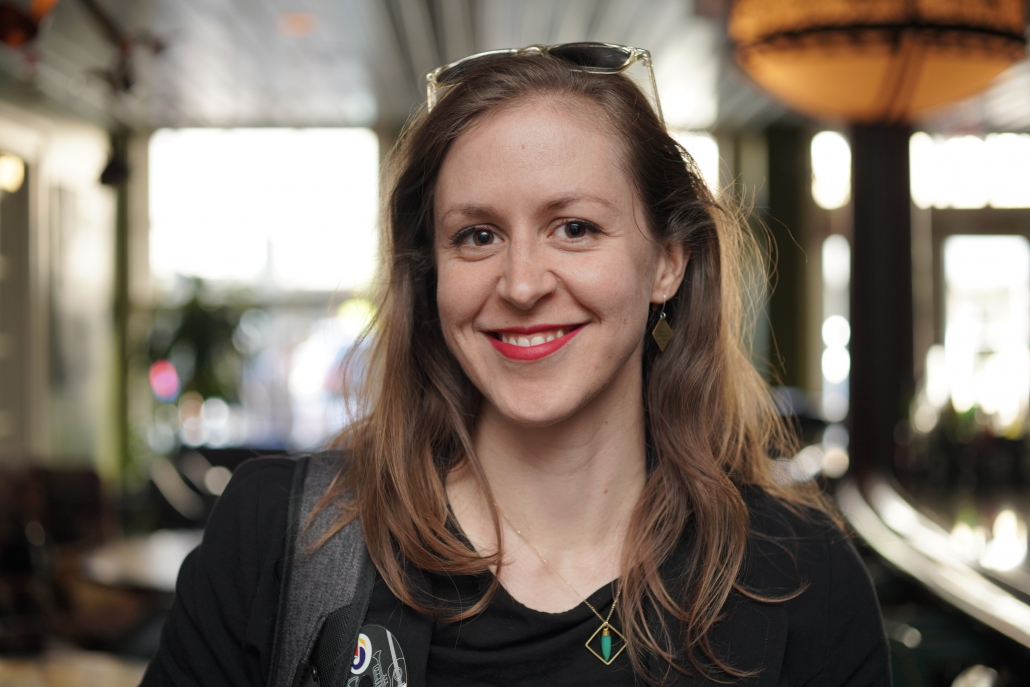
Erin Tatum (BBA ’08, AB ’08, MPA ’14) is the managing director for the Savannah Music Festival. Photo: Elizabeth Leitzell
SMF connects artists with audiences. Throughout the year, it hosts educational programs for local schoolchildren and young musicians. Then, SMF culminates in an internationally-acclaimed cross-genre music festival that is also the state of Georgia’s largest musical arts event.
“Seeing the music performances is the reward at the end of the rainbow,” Tatum said. “Our artistic director does the programming, but I’m working with him closely to ensure that the logistics and details are right by the time we get the performers on a stage in front of an audience.”
Seeing the impact
While at UGA, Tatum knew she wanted to work in the nonprofit performing arts space.
“To me, it was about the community impact,” Tatum said. “I wanted to actually be in a community and see the impact that an organization can have.”
A connection made at UGA introduced her to a job with the Oconee Performing Arts Society in Greene County, but a fondness for Athens led her back to the Classic City in 2009 to work for UGA’s Performing Arts Center. The mission-based, education-focused atmosphere gave her a taste of the community impact she was seeking.
“The work that I did there really attracted me to the Savannah Music Festival,” Tatum said.

After an evening of the Savannah Music Festival, managing director Erin Tatum chats backstage. During the festival, Tatum’s bike is her preferred mode of transportation. Photo: Elizabeth Letizell
When Tatum joined the Savannah Music Festival in 2014, it was preparing to launch its Musical Explorers program. Through Musical Explorers, SMF brings music education into local elementary school classrooms. Through a partnership with Carnegie Hall’s Weill Music Institute, students learn about three diverse music genres each semester and attend an end-of-semester performance featuring the artists they’ve studied.
“These kids experience a concert – some of them for the first time. They know all the words, even words that are not in English,” Tatum said. “The entire curriculum is based on this multicultural experience, so they’re not just learning about the music. They’re making social studies, reading and writing connections.”
In 2019, SMF’s educational programs like Musical Explorers reached 10,658 participants. When the program pivoted to a virtual format in response to the COVID-19 pandemic, SMF expanded its reach. The 2020-2021 program includes participants in 31 states and 15 countries.
SMF also stimulates the greater-Savannah economy. In 2019, nearly 40% of the festival’s 29,065 participants traveled from more than 100 miles away. When they aren’t attending performances orchestrated by Tatum, these visitors support the city’s restaurant and tourism industries.
Returning to the stage
After a year of silent concert halls and empty stages, this year’s festival will bring music back to Savannah’s stages. Instead of the typical 17-day format, the 2021 festival will take place from May 23 to May 30 at two indoor venues with limited capacity crowds and social distancing. Even with the changes, Tatum looks forward to bringing live music to the stage again.
“It is sad that we haven’t seen live music for a year, but we’ve also been able to make some really cool adjustments,” Tatum said. “We’ve gotten through it. We’re resilient and we did it thanks to the support of our community and donors. Those things make me hopeful we can move forward.”
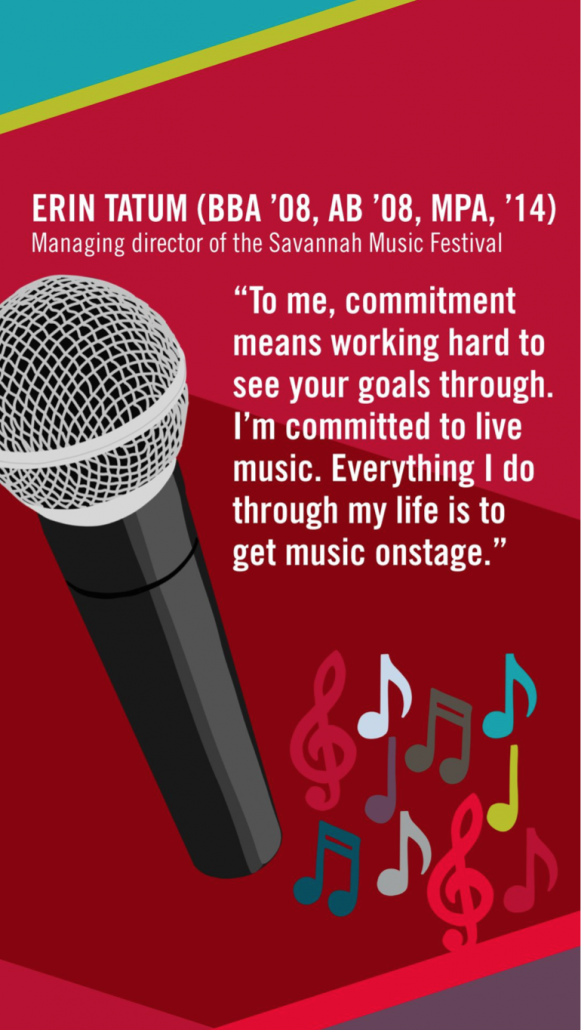
WHERE COMMITMENT MEETS COMMUNITY
Whether life takes them to new cities or to the neighborhoods where they grew up, Georgia Bulldogs do more than get jobs – they elevate their communities. Bulldogs lead nonprofits, effect change and create opportunities for others. Wherever people are suffering, wherever communities are looking for effective leaders and whenever the world cries out for better solutions, Bulldogs are there to answer the call to service. It’s more than our passion. It’s our commitment.
Caroline Odom, an intern with UGA’s Division of Development and Alumni Relations, brings you a spring blog series that celebrates Bulldogs who embrace that commitment to helping others in their communities thrive.

